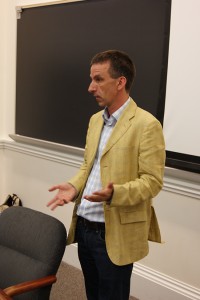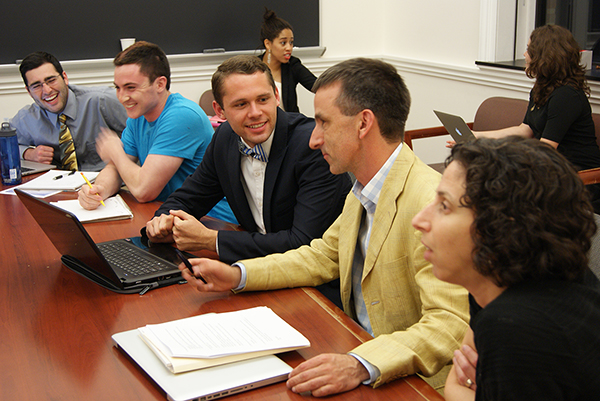
Dr. Henze, recently awarded the 2015 George R. Brown Award for Superior Teaching, lectures in Religion 392, Jerusalem: Holy City in Time and Imagination.
“Many of my students become better writers, and this is the greatest skill a student can have,” explains Dr. Matthias Henze, the Isla Carroll and Percy E. Turner Professor of Hebrew Bible and Early Judaism in Rice University’s Religion Department, who was recently recognized with the 2015 George R. Brown Award for Superior Teaching. Henze has written and edited nine books, has lectured internationally, has run at least one marathon on each of the seven continents, and has learned to communicate in many languages, both modern and ancient. This list of interests and skills is most impressive because Henze uses them as tools to create a stimulating classroom environment, to develop personalized courses for Rice students, and to constantly assess Rice University’s needs so that voids can be filled in Rice’s undergraduate education. Through his work as a Rice professor, Henze seeks to prepare students to positively impact the world through their careers and their lives.
When he arrived at Rice in 1997, Henze entertained a more traditional lecture style classroom, but he has exchanged that style of teaching for a more stimulating atmosphere with guided discussions. Engaging students in his language-based courses, his text-based courses, and his biblical book-based courses is not a challenge for Henze: “Students already have an interest in the material – reading the Bible offers a great teaching opportunity, because there is a lot at stake and students feel challenged.” Henze knows that each student has a unique motivation for enrolling in one of his 10-12 person seminars. Throughout the semester, Henze seeks to reach each of his students individually. He starts by learning their names, their reasons for selecting his course, and their background. Then, he utilizes assignments and class discussions to understand his students on a deeper level. For instance, in one of his courses, students journal through OWL-Space. Not only does Henze peruse these journal posts, he requires students to read and comment on each other’s reflections, too. “It’s helpful for students to process and document their own intellectual and emotional itineraries and to observe what others feel and have found and reflect on it,” Henze notes. While this activity benefits the students immensely, Henze connects with his students in and out of class by referencing ideas they have expressed in these journals, suggesting future reading for them based on their interests, and asking questions that help them to develop their thought processes.
According to Henze, the Humanities play a critical role in the education of undergraduate students regardless of major, year, or career goals. Henze believes that the Humanities help students in “becoming better writers and communicators and learning how to create, build, and defend an argument – skills really important in a constantly changing world that will help students adapt once they leave Rice for the career field.”
Henze has three specific goals that he uses to shape all of his courses. First of all, he wants his students to gain self-awareness of their identities, prejudices, and beliefs. Activities such as journaling accomplish this in an informal way, but Henze also prods this personal growth verbally by incorporating questions specifically geared towards his students to help them develop self-awareness.
Secondly, Henze wants to expose students to alternative viewpoints. “A college campus is a marketplace of ideas. It should be an environment where students are free to explore and express themselves without worrying about repercussions.” Participation is a critical aspect of Henze’s courses and does contribute to course grades. If a student is not interacting frequently, Henze takes time to identify why they might feel uncomfortable participating and encourages those students to participate to the best of their abilities.
Lastly, but most importantly, Henze believes that the ability to articulate and defend beliefs and arguments is invaluable. To develop this skill in his students, Henze’s courses include a rigorous formal writing component. For Henze, working one-on-one with students on their papers outside of class is one of the most rewarding parts of teaching. His students agree. In a course evaluation a few years ago, one student commented that while the content of Henze’s course might not be relevant for him in the future, Dr. Henze had made him a better writer. Henze notes, “While Biblical texts are my passion, I know that writing is what is most important for many of my students.” Additionally, students must make oral presentations, another integral component in defending one’s beliefs.

In his seminars, Dr. Henze and his students sit around a table to encourage participation and stimulate discussion amongst the entire group.
While Henze is clearly passionate about helping students in the classroom, he has also augmented the Rice community by establishing the Program for Jewish Studies (https://jewishstudies.rice.edu). While he himself is not Jewish, Henze realized that Rice has become a better place since it has begun to offer courses in Jewish studies because it has made Rice more “welcoming.” The majority of students in these courses are not Jewish but have an interest in Judaism. Many students are fascinated by issues such as identity, migration, and the treatment of minorities that the Jewish people have experienced throughout history. While there are several classes offered each semester (many of which are also cross-listed) in Jewish Studies, the Program for Jewish Studies has also created new opportunities for students such as stipends for studying abroad, language learning, social gatherings, and activities with Hillel.
In keeping with his philosophy of keeping students engaged, Henze has helped create a new course, “Jerusalem: Holy City in Time and Imagination.” This course is for any students who want to travel to Jerusalem during spring break, and the Program heavily subsidizes this trip, too. As he talked about this course, Henze paged through a travel guide that the students in this course had prepared for the trip. Each student was required to research and plan a visit to a site in Jerusalem. During the trip, the student had to present their site in Israel. Henze laughed as he remembered, “The tour guide for the trip was blown away!”
One of the best aspects of Rice University is that the professors seek to holistically educate students. Henze embodies this idea. Whether he is interacting with students one-on-one, in a small classroom, in a lecture, or through an opportunity in the Program for Jewish Studies that he developed to broaden and improve the undergraduate studies at Rice, Henze wants to help students learn to think, articulate, and defend themselves. He views a solid understanding of the Humanities as a launchpad for success in any career, and he genuinely desires to “foster intellectual independence” in each and every one of his students.

